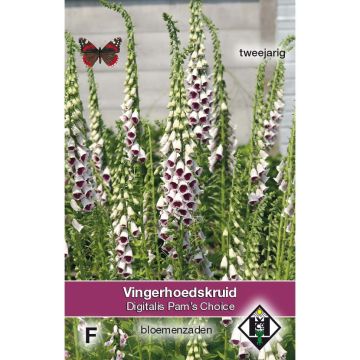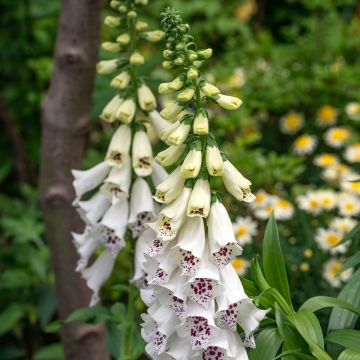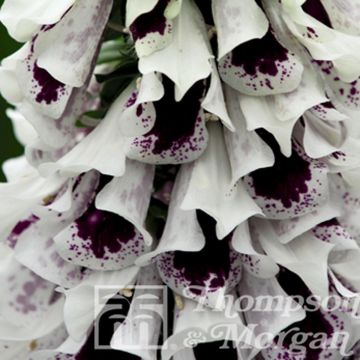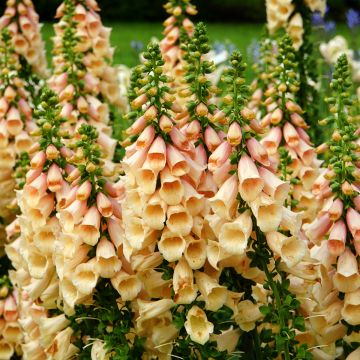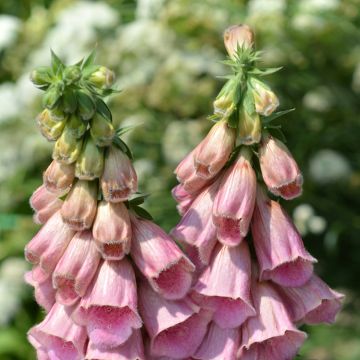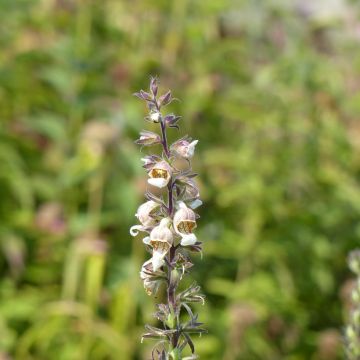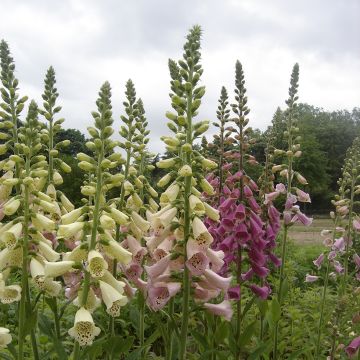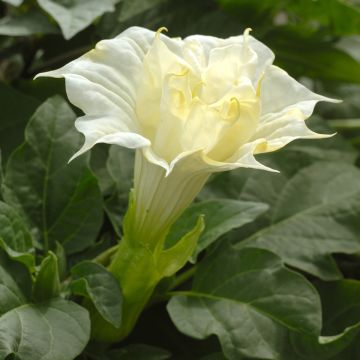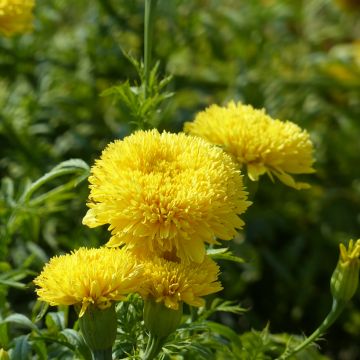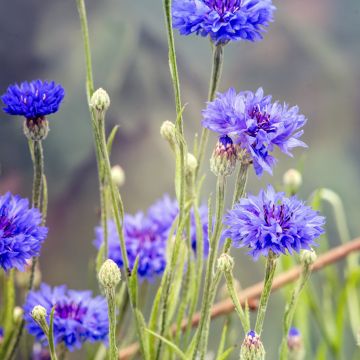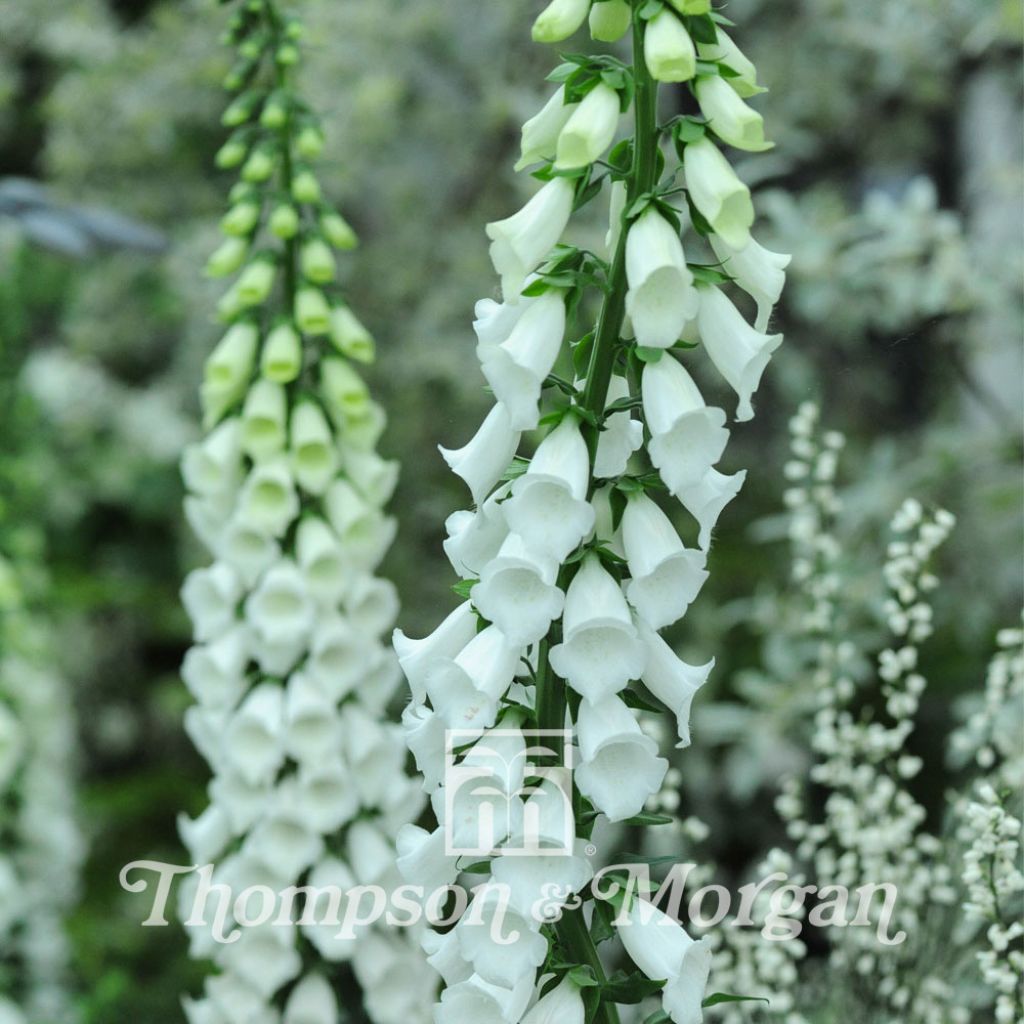

White Foxglove Seeds - Digitalis purpurea var. alba
White Foxglove Seeds - Digitalis purpurea var. alba
Digitalis purpurea f. albiflora Alba
Foxglove, Common Foxglove, Lady's Glove
I sowed these seeds at the beginning of spring, so I must wait for them to sprout before I can give you my opinion.
Martine P., 25/04/2018
Why not try an alternative variety in stock?
View all →This item cannot be shipped to the selected country
Dispatch by letter from €3.90
More information
Schedule delivery date,
and select date in basket
This plant carries a 6 months recovery warranty
More information
We guarantee the quality of our plants for a full growing cycle, and will replace at our expense any plant that fails to recover under normal climatic and planting conditions.
Seed-only orders are dispatched by sealed envelope. The delivery charge for seed-only orders is €3.90.


Does this plant fit my garden?
Set up your Plantfit profile →
Description
Digitalis purpurea var. alba is the white-flowered version of the wild foxglove. It displays elegant spikes of pure white tubular flowers above a rosette of deep green leaves. Superb in light shade and woodland gardens in humus-rich, well-drained soils.
Digitalis purpurea, commonly known as Foxglove, is herbaceous biennial plant (perennial if the flower spikes are pruned before seeding). It belongs to the Scrophulariaceae family. During the first year, it forms a large 45 cm rosette of coarse dark green leaves, with toothed margins and prominent veins. They are covered in fine, greyish white hairs that give the leaves a soft, woolly appearance. During its second year, in May-June, up to 5 hollow, sturdy stems emerge from the rosette. 'Alba' grows to about 1.50 m tall, carrying dense flower spikes made up of numerous pure white, downward-facing tubular flowers. They occasionally feature discreet brown spots on the inside. The flowers bloom from the base of the spike upwards, attracting honey bees and bumblebees by the dozen.
Foxgloves enjoy dappled sunlight to part-shade and cool, humus-rich soils. They pair well with roses or single-flowered perennials such as columbines, cornflowers, Astrantias or thalictrum. Try growing them in large containers on the patio to make the most of the long-lasting blooms! Foxgloves also fit naturally into woodland gardens alongside perennial geraniums, heucheras and ferns. The tall flower spikes are suitable for cutting and look fabulous in large arrangements.
Digitalis purpurea seeds are best left to experienced, seasoned gardeners as they are extremely small, like fine dust.
Report an error about the product description
Flowering
Foliage
Plant habit
Safety measures
Botanical data
Digitalis
purpurea f. albiflora
Alba
Plantaginaceae
Foxglove, Common Foxglove, Lady's Glove
ingestion
Cette plante est toxique si elle est ingérée volontairement ou involontairement.
Ne la plantez pas là où de jeunes enfants peuvent évoluer, et lavez-vous les mains après l'avoir manipulée.
Pensez à conserver l'étiquette de la plante, à la photographier ou à noter son nom, afin de faciliter le travail des professionnels de santé.
Davantage d'informations sur https://plantes-risque.info
Other Foxglove - Digitalis seeds
Planting and care
Sow foxgloves from January to May, on the surface of a good, moist, well-draining soil and place it at a temperature of 18-29°C. Lightly cover the seeds with vermiculite. Place in a mini-greenhouse or polyethylene bag until the seeds germinate, which usually takes 14 to 30 days. Keep the seedlings near light, as this facilitates germination. Transplant the plants when they are large enough to handle into 8 cm diameter trays or pots. Gradually acclimatize the plants to cooler conditions for a few weeks before planting them after all risk of frost, with a spacing of 45 to 60 cm between each plant. Foxgloves grown from early sowings may sometimes flower in the first year.
Purple foxgloves and their varieties prefer partial shade and a soil that is slightly acidic, loamy, and humus-rich, but not too rich. They are very hardy plants, but their lifespan is quite short. They self-sow abundantly in the garden, but the resulting plants are rarely identical to the parent plants when it comes to horticultural selections.
Sowing period
Intended location
-
, onOrder confirmed
Reply from on Promesse de fleurs
Flower seeds
Haven't found what you were looking for?
Hardiness is the lowest winter temperature a plant can endure without suffering serious damage or even dying. However, hardiness is affected by location (a sheltered area, such as a patio), protection (winter cover) and soil type (hardiness is improved by well-drained soil).

Photo Sharing Terms & Conditions
In order to encourage gardeners to interact and share their experiences, Promesse de fleurs offers various media enabling content to be uploaded onto its Site - in particular via the ‘Photo sharing’ module.
The User agrees to refrain from:
- Posting any content that is illegal, prejudicial, insulting, racist, inciteful to hatred, revisionist, contrary to public decency, that infringes on privacy or on the privacy rights of third parties, in particular the publicity rights of persons and goods, intellectual property rights, or the right to privacy.
- Submitting content on behalf of a third party;
- Impersonate the identity of a third party and/or publish any personal information about a third party;
In general, the User undertakes to refrain from any unethical behaviour.
All Content (in particular text, comments, files, images, photos, videos, creative works, etc.), which may be subject to property or intellectual property rights, image or other private rights, shall remain the property of the User, subject to the limited rights granted by the terms of the licence granted by Promesse de fleurs as stated below. Users are at liberty to publish or not to publish such Content on the Site, notably via the ‘Photo Sharing’ facility, and accept that this Content shall be made public and freely accessible, notably on the Internet.
Users further acknowledge, undertake to have ,and guarantee that they hold all necessary rights and permissions to publish such material on the Site, in particular with regard to the legislation in force pertaining to any privacy, property, intellectual property, image, or contractual rights, or rights of any other nature. By publishing such Content on the Site, Users acknowledge accepting full liability as publishers of the Content within the meaning of the law, and grant Promesse de fleurs, free of charge, an inclusive, worldwide licence for the said Content for the entire duration of its publication, including all reproduction, representation, up/downloading, displaying, performing, transmission, and storage rights.
Users also grant permission for their name to be linked to the Content and accept that this link may not always be made available.
By engaging in posting material, Users consent to their Content becoming automatically accessible on the Internet, in particular on other sites and/or blogs and/or web pages of the Promesse de fleurs site, including in particular social pages and the Promesse de fleurs catalogue.
Users may secure the removal of entrusted content free of charge by issuing a simple request via our contact form.
The flowering period indicated on our website applies to countries and regions located in USDA zone 8 (France, the United Kingdom, Ireland, the Netherlands, etc.)
It will vary according to where you live:
- In zones 9 to 10 (Italy, Spain, Greece, etc.), flowering will occur about 2 to 4 weeks earlier.
- In zones 6 to 7 (Germany, Poland, Slovenia, and lower mountainous regions), flowering will be delayed by 2 to 3 weeks.
- In zone 5 (Central Europe, Scandinavia), blooming will be delayed by 3 to 5 weeks.
In temperate climates, pruning of spring-flowering shrubs (forsythia, spireas, etc.) should be done just after flowering.
Pruning of summer-flowering shrubs (Indian Lilac, Perovskia, etc.) can be done in winter or spring.
In cold regions as well as with frost-sensitive plants, avoid pruning too early when severe frosts may still occur.
The planting period indicated on our website applies to countries and regions located in USDA zone 8 (France, United Kingdom, Ireland, Netherlands).
It will vary according to where you live:
- In Mediterranean zones (Marseille, Madrid, Milan, etc.), autumn and winter are the best planting periods.
- In continental zones (Strasbourg, Munich, Vienna, etc.), delay planting by 2 to 3 weeks in spring and bring it forward by 2 to 4 weeks in autumn.
- In mountainous regions (the Alps, Pyrenees, Carpathians, etc.), it is best to plant in late spring (May-June) or late summer (August-September).
The harvesting period indicated on our website applies to countries and regions in USDA zone 8 (France, England, Ireland, the Netherlands).
In colder areas (Scandinavia, Poland, Austria...) fruit and vegetable harvests are likely to be delayed by 3-4 weeks.
In warmer areas (Italy, Spain, Greece, etc.), harvesting will probably take place earlier, depending on weather conditions.
The sowing periods indicated on our website apply to countries and regions within USDA Zone 8 (France, UK, Ireland, Netherlands).
In colder areas (Scandinavia, Poland, Austria...), delay any outdoor sowing by 3-4 weeks, or sow under glass.
In warmer climes (Italy, Spain, Greece, etc.), bring outdoor sowing forward by a few weeks.


































